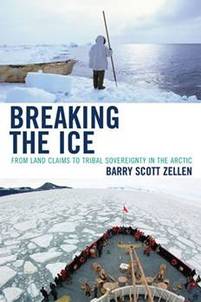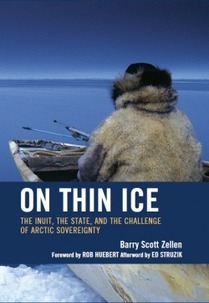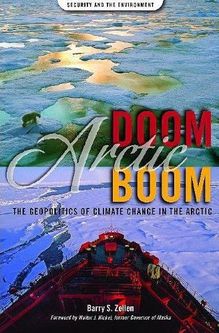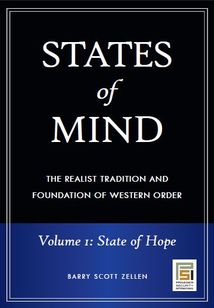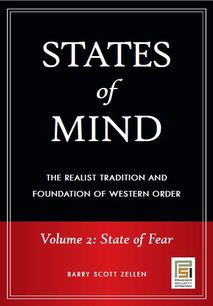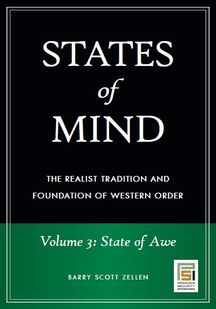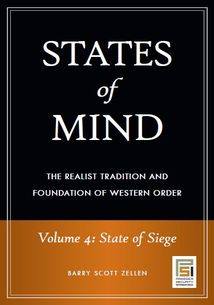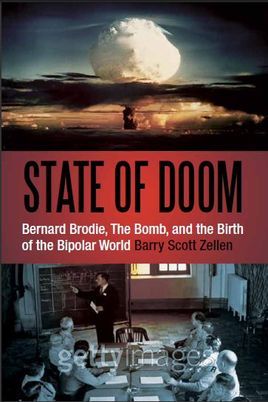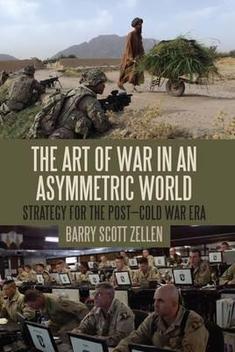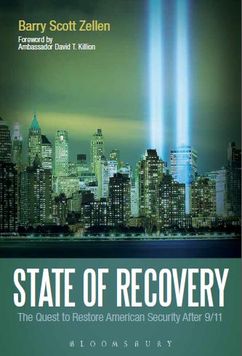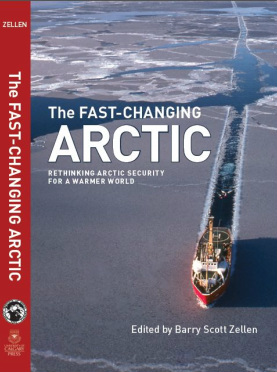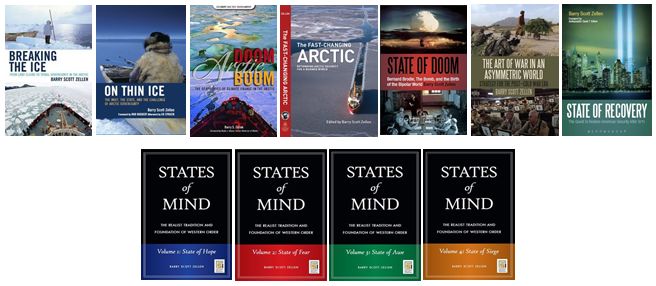Barry Scott Zellen, PhD

Day 1 as a Fulbright Scholar in Iceland!
Barry Scott Zellen is a research scholar specializing in Arctic geopolitics, international relations, and the tribal foundations of world order. Zellen's early research and writing focused on the Western Arctic region, where he lived during the 1990s while managing several northern, Aboriginal language media organizations funded by the Northern Native Broadcast Access Program (NNBAP), and occasionally developing and teaching college courses on Arctic land claims for Arctic College (now Aurora College) in Yellowknife, NWT and the Center for Northern Studies (CNS) in Wolcott, VT. In more recent years, Zellen's research has shifted from focusing exclusively on the Arctic region to include numerous indigenous peoples of the Pacific for a more global and comparative understanding of the role of tribal polities in international relations, from Oceania to the Arctic.
Since 2018, he has served as a Research Scholar in the Department of Geography at the University of Connecticut (UConn); and since 2012, he has been an Arctic Security Fellow at the Institute of the North, founded by and dedicated to the preservation of the important historic legacy of Alaska governor (1966-69 and 1990-94) and principled U.S. Secretary of the Interior (1960-70) Wally Hickel, who authored a guest foreword to Zellen's 2009 volume, Arctic Doom, Arctic Boom: The Geopolitics of Climate Change in the Arctic. Zellen also serves as International Arctic Correspondent for Intersec: The Journal of International Security, and earlier served as its Homeland Security and Counterterrorism Correspondent (2001-10) and as a contributing columnist (2011-21).
Zellen is a mid-career returnee to the academic world: in 2015, at the young-at-heart age of 51, he completed and defended his dissertation at the University of Lapland (earning the high honor, eximia cum laude approbatur), and from 2016-18 he conducted a two-year, field-based postdoctoral research project funded by the Kone Foundation in Helsinki on "Tribal Buffer Zones and Regional Stability from the Polar to Oceanic Region: Understanding the Interface between Indigenous Homelands and Modern States, and the Foundations for Stable Borderlands." Its aim was to understand the theoretical contours of, and practical implications of, this oft-overlooked but nonetheless distinct structure in world politics -- what he describes as the long-ignored but none-the-less salient "4th image" in IR that can be pre-, sub-, trans- and/or post-state, and which is contiguous with the historic boundaries of tribal and indigenous homelands which, after state expansion, have become subdivided by recognized international frontiers. He studied several indigenous homelands around the world, from Borneo and Singapore in the Malay Archipelago to Okinawa and Hokkaido in the Japanese Archipelago to Iroquoia in the Great Lakes region of North America.
In addition to the many articles he has written, Zellen has authored or edited a dozen books on Arctic, indigenous and strategic issues published by presses (and series) that include: the Routledge Complex Real Property Rights series; ABC-Clio's Praeger Security International imprint as well as Praeger's Security and the Environment series; Stanford University Press' Security Studies series; University of Calgary Press' Northern Lights series; Bloomsbury Academic; Continuum Books; Lexington Books; and Lynne Rienner Books:
Arctic Trilogy (2008-2010)
Zellen's first book, part of a three volume project on the Arctic region, was Breaking the Ice: From Land Claims to Tribal Sovereignty in the Arctic (Lexington Books 2008), with forewords by former Inuvik, NWT mayor Dick Hill and deputy mayor Eddie Kolausok, both now greatly missed. Available in both paperback and hard cover editions, BTI examines the political modernization of the Western Arctic as the region's indigenous people reclaimed much of their traditional sovereignty -- using contemporary constitutional, legal, and political processes, and resulting in the emergence of a neotribal fusion of indigenous and modern political institutions, with overlapping governing structures transforming the relationship of tribe and state from inherent conflict to collaboration and functional integration.
In its sequel, available in both hard cover and e-book versions, On Thin Ice: The Inuit, the State and the Challenge of Arctic Sovereignty (Lexington Books, November 2009), with a foreword by University of Calgary's renown Arctic security expert Dr. Rob Huebert and an afterword by award-winning Arctic author and Edmonton Journal columnist Ed Struzik, Zellen examines the ongoing challenges of asserting sovereignty in the Arctic region, as indigenous sub-state and modern state actors each seek to influence the evolution of diplomatic and strategic policies in the circumpolar region, and to determine Arctic security policies.
Zellen's third book on the polar region, Arctic Doom, Arctic Boom: The Geopolitics of Climate Change in the Arctic (Praeger, Security and the Environment Series, 2009), with forewords by (former) Governor of Alaska and U.S. Interior Secretary Wally Hickel, and Naval Postgraduate School professor and department chairman Dan Moran, was published in October 2009 nd is available in hard cover as well as e-book formats. It examines the geostrategic impacts of a polar thaw, and questions the overly pessimistic presumptions of climate doom, positing that the post-Arctic world will be a more united, prosperous and peaceful world.
Since 2018, he has served as a Research Scholar in the Department of Geography at the University of Connecticut (UConn); and since 2012, he has been an Arctic Security Fellow at the Institute of the North, founded by and dedicated to the preservation of the important historic legacy of Alaska governor (1966-69 and 1990-94) and principled U.S. Secretary of the Interior (1960-70) Wally Hickel, who authored a guest foreword to Zellen's 2009 volume, Arctic Doom, Arctic Boom: The Geopolitics of Climate Change in the Arctic. Zellen also serves as International Arctic Correspondent for Intersec: The Journal of International Security, and earlier served as its Homeland Security and Counterterrorism Correspondent (2001-10) and as a contributing columnist (2011-21).
Zellen is a mid-career returnee to the academic world: in 2015, at the young-at-heart age of 51, he completed and defended his dissertation at the University of Lapland (earning the high honor, eximia cum laude approbatur), and from 2016-18 he conducted a two-year, field-based postdoctoral research project funded by the Kone Foundation in Helsinki on "Tribal Buffer Zones and Regional Stability from the Polar to Oceanic Region: Understanding the Interface between Indigenous Homelands and Modern States, and the Foundations for Stable Borderlands." Its aim was to understand the theoretical contours of, and practical implications of, this oft-overlooked but nonetheless distinct structure in world politics -- what he describes as the long-ignored but none-the-less salient "4th image" in IR that can be pre-, sub-, trans- and/or post-state, and which is contiguous with the historic boundaries of tribal and indigenous homelands which, after state expansion, have become subdivided by recognized international frontiers. He studied several indigenous homelands around the world, from Borneo and Singapore in the Malay Archipelago to Okinawa and Hokkaido in the Japanese Archipelago to Iroquoia in the Great Lakes region of North America.
In addition to the many articles he has written, Zellen has authored or edited a dozen books on Arctic, indigenous and strategic issues published by presses (and series) that include: the Routledge Complex Real Property Rights series; ABC-Clio's Praeger Security International imprint as well as Praeger's Security and the Environment series; Stanford University Press' Security Studies series; University of Calgary Press' Northern Lights series; Bloomsbury Academic; Continuum Books; Lexington Books; and Lynne Rienner Books:
- Zellen's authored monographs include: Breaking the Ice: From Land Claims to Tribal Sovereignty in the Arctic (Lexington Books, 2008); Arctic Doom, Arctic Boom: The Geopolitics of Climate Change in the Arctic (Praeger Security and the Environment Series, ABC-Clio, 2009); On Thin Ice: The Inuit, the State and the Challenge of Arctic Sovereignty (Lexington Books, 2009); The Realist Tradition in International Relations: The Foundations of Western Order (4 Volumes, including: volume 1, State of Hope: Order in the Age of Classical War; volume 2, State of Fear: Order in the Age of Limited War; volume 3, State of Awe: Order in the Age of Total War; and volume 4, State of Siege: Order in the Age of Insurgency) (Praeger Security International, ABC-Clio, 2011); State of Doom: Bernard Brodie, the Bomb, and the Birth of the Bipolar World (Continuum Books, 2011); The Art of War in an Asymmetric World: Strategy for the Post-Cold War Era (Continuum Books, 2012); State of Recovery: The Quest to Restore American Security After 9/11 (Bloomsbury, January 2013); and Arctic Exceptionalism: Cooperation in a Contested World (Lynne Rienner Books, 2024).
- Zellen is also editor of The Fast-Changing Arctic: Rethinking Arctic Security for a Warming World (University of Calgary Press, Northern Lights Series, 2013); and co-editor of Culture, Conflict, and Counterinsurgency (Stanford University Press, Stanford Security Studies Series, 2014) and Land, Indigenous People and Conflict (Routledge, Complex Real Property Rights Series, 2015).
- He has recently completed his first 14th book manuscript (and 11th monograph) on the theoretical and historical foundations of Arctic exceptionalism, rooted in his '4th image' in IR theory, which he also dubs 'fourth image theory' which parallels and pays homage to fourth world studies. Zellen is founder of both "constructive realism" and "4th image theory" in the field of international relations theory, the latter a theoretical outgrowth of his research on Arctic indigenous peoples and polities, and the former his critical response to neorealism and a restoration of the perceived saliency of substate actors in international relations, inclusive of the individual and tribal actors,
Arctic Trilogy (2008-2010)
Zellen's first book, part of a three volume project on the Arctic region, was Breaking the Ice: From Land Claims to Tribal Sovereignty in the Arctic (Lexington Books 2008), with forewords by former Inuvik, NWT mayor Dick Hill and deputy mayor Eddie Kolausok, both now greatly missed. Available in both paperback and hard cover editions, BTI examines the political modernization of the Western Arctic as the region's indigenous people reclaimed much of their traditional sovereignty -- using contemporary constitutional, legal, and political processes, and resulting in the emergence of a neotribal fusion of indigenous and modern political institutions, with overlapping governing structures transforming the relationship of tribe and state from inherent conflict to collaboration and functional integration.
In its sequel, available in both hard cover and e-book versions, On Thin Ice: The Inuit, the State and the Challenge of Arctic Sovereignty (Lexington Books, November 2009), with a foreword by University of Calgary's renown Arctic security expert Dr. Rob Huebert and an afterword by award-winning Arctic author and Edmonton Journal columnist Ed Struzik, Zellen examines the ongoing challenges of asserting sovereignty in the Arctic region, as indigenous sub-state and modern state actors each seek to influence the evolution of diplomatic and strategic policies in the circumpolar region, and to determine Arctic security policies.
Zellen's third book on the polar region, Arctic Doom, Arctic Boom: The Geopolitics of Climate Change in the Arctic (Praeger, Security and the Environment Series, 2009), with forewords by (former) Governor of Alaska and U.S. Interior Secretary Wally Hickel, and Naval Postgraduate School professor and department chairman Dan Moran, was published in October 2009 nd is available in hard cover as well as e-book formats. It examines the geostrategic impacts of a polar thaw, and questions the overly pessimistic presumptions of climate doom, positing that the post-Arctic world will be a more united, prosperous and peaceful world.
Constructive Realism: History's Bridge Linking Theory to Action (2011)
In addition to his research and writing on the Arctic, Zellen has published six volumes as part of his ongoing States of Mind Project examining the origins and evolution of the modern state, and the important role of realist theory in explaining international behavior. He is also the founder of "constructive realism" in IR theory, which provides an enduring bridge linking theory to action for over two and a half millennia.
His first four volumes in the States of Mind Project were published as a quadrology by Praeger Security International (ABC-Clio) in August 2011, known collectively as The Realist Tradition in International Relations: The Foundations of Western Order -- it looks at the genesis of constructive realism during classical era, and its evolution and endurance across the stage of human history. With forewords by two of his students from the 1980s -- U.S. Ambassador to UNESCO David T. Killion, and Benedictine University professor Dr. Joel M. Ostrow -- Zellen's treatise probes the effort by political thinkers to catalyze action across over two thousand years of recurring political and military chaos, and mankind's continuing, at times desperate, and always impassioned search for an enduring and pacific political order.
Its four volumes include volume 1, State of Hope: Order in the Age of Classical War; volume 2, State of Fear: Order in the Age of Limited War; volume 3, State of Awe: Order in the Age of Total War; and volume 4, State of Siege: Order in the Age of Insurgency. This celebration and revival of the oft-overlooked first "Waltzian image" as the fundamental building block of world order and the ultimate driver of international order is at once a rebuttal of the overly structuralized neorealist paradigm and the more fragmented constructivist response to neorealism, while nonetheless recognizing the underlying (and earnest) aspiration of constructivism: the articulation of ideational blueprints for constructing new political orders.
His first four volumes in the States of Mind Project were published as a quadrology by Praeger Security International (ABC-Clio) in August 2011, known collectively as The Realist Tradition in International Relations: The Foundations of Western Order -- it looks at the genesis of constructive realism during classical era, and its evolution and endurance across the stage of human history. With forewords by two of his students from the 1980s -- U.S. Ambassador to UNESCO David T. Killion, and Benedictine University professor Dr. Joel M. Ostrow -- Zellen's treatise probes the effort by political thinkers to catalyze action across over two thousand years of recurring political and military chaos, and mankind's continuing, at times desperate, and always impassioned search for an enduring and pacific political order.
Its four volumes include volume 1, State of Hope: Order in the Age of Classical War; volume 2, State of Fear: Order in the Age of Limited War; volume 3, State of Awe: Order in the Age of Total War; and volume 4, State of Siege: Order in the Age of Insurgency. This celebration and revival of the oft-overlooked first "Waltzian image" as the fundamental building block of world order and the ultimate driver of international order is at once a rebuttal of the overly structuralized neorealist paradigm and the more fragmented constructivist response to neorealism, while nonetheless recognizing the underlying (and earnest) aspiration of constructivism: the articulation of ideational blueprints for constructing new political orders.
State of Doom: Bernard Brodie, the Bomb and the Birth of the Bipolar World (2011)
With a Foreword by Dr. Peter R. Lavoy, Acting Assistant Secretary of Defense for Asian and Pacific Security Affairs
(APSA).
(APSA).
|
Zellen's eighth monograph to press is State of Doom: Bernard Brodie, the Bomb, and the Birth of the Bipolar World. It was published in December 2011 by Continuum Books (now Bloomsbury Academic) in both paperback and hard cover formats.
State of Doom explores one of the greatest strategic minds of the 20th century -- Bernard Brodie, a chief intellectual architect of the nuclear age who endeavored to not only reintroduce a new generation of students to the classic works of Carl von Clausewitz in English, but to modernize Clausewitzian theory for the new and unprecedented dangers of the nuclear era. Brodie, more than any other theorist of his time -- with perhaps the exception of neorealist theorist Kenneth Waltz, whose theory of international politics echoed Brodie's strategic-theoretical map -- recognized the subtleties and complexities of realist thinking and successfully adapted realism to the unprecedented risks of the nuclear age. |
The Art of War in an Asymmetric World: Strategy for the Post-Cold War World (2012)
In July 2012, Zellen's ninth monograph, The Art of War in an Asymmetric World: Strategy for the Post-Cold War Era, came to press with Continuum Books (now Bloomsbury Academic) in hard cover format, with a paperback edition released on January 16, 2014.
|
With a foreword Dr. David A. Anderson, Professor of Strategic Studies and Odom Chair of Joint, Interagency and Multinational Operations at the U.S. Army Command and General Staff College, it explores the efforts by contemporary strategic thinkers and planners to tackle the challenges of international terrorism and insurgency after the Cold War. And to construct actionable strategic responses to the enigmatic challenges of asymmetry, particularly in the post-9/11 years -- presenting a strategic-intellectual mosaic of our own time, and of our (often) innovative adaptations to a new array of asymmetrical and unanticipated threats.
Originally this fifth volume in Zellen's States of Mind Project , this volume examines the ideas of key theorists of asymmetry who populate the contemporary stage of constructive realism, including such thinkers as: John Arquilla; Thomas P.M. Barnett; Arthur K. Cebrowski; Jim Gant; Samuel P. Huntington; Robert D. Kaplan; David J. Kilcullen; William H. McRaven; and David Ronfeldt. Contents: 1. Global Disorder: The Post-Cold War Era 2. Asymmetrical Conflict and the Information Age 3. The Global War on Terror 4. The Art of War in an Asymmetric World 5. The Tribal Foundations of Order |
State of Recovery: The Quest to Restore American Security after 9/11 (2013)Zellen's tenth monograph -- State of Recovery: The Quest to Restore American Security after 9/11 -- came to press in January 2013 with Bloomsbury Academic, with a paperback edition scheduled for release in July 2014.
With a foreword by U.S. Ambassador David T. Killion, State of Recovery presents a retrospective exploration of the first ten years of innovation that followed the September 11 attacks, as America's innovators, technologists and security professionals came together to redress the gaping security challenges confronting America and the West after the Twin Towers fell. Originally the sixth and final volume in Zellen's States of Mind Project, it chronicles their efforts to construct new policies and strategies designed to restore American security, and prevent future mass-casualty attacks on the American homeland. |
The Fast-Changing Arctic: Rethinking Arctic Security for a Warmer World (2013)Zellen continues to explore the strategic consequences of the polar thaw, and to map the geopolitics of what he dubbed in 2006 the "post-Arctic world." On July 1st, 2013, his first edited Arctic volume came to press with the University of Calgary Press, as its 15th volume in UCP's prestigious Northern Lights Series: The Fast-Changing Arctic: Rethinking Arctic Security for a Warmer World. It includes contributions from a mix of renowned Arctic security experts and a new generation of Arctic scholars and military professionals from America, Canada, Europe and Asia.
In this timely new publication -- with a foreword by the Lieutenant Governor of Alaska, Mead Treadwell, and an introduction and afterword by University of Alaska Fairbanks Distinguished Professor of Geography and Arctic Policy, Lawson W. Brigham -- several international scholars and military professionals come together to explore the strategic consequences of the thawing of the Arctic. Their analyses of efforts by governments and defense, security, and coast guard organizations to address these challenges make timely and urgent reading. Rather than a single national perspective, The Fast-Changing Maritime Arctic brings together circumpolar viewpoints from North America, Europe and Asia for an integrated discussion of strategic military, diplomatic, and security challenges in the high North. Thoughtful analyses are included of different regions, climate issues, institutions, and foreign and security policies. This is an important book for students of international studies, political science, and northern studies. |
Culture, Conflict, and Counterinsurgency (2014)
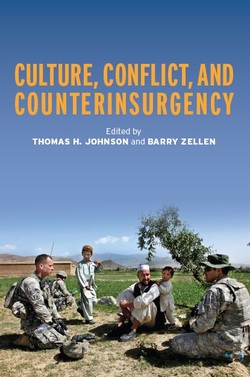
Zellen's 12th book and second edited (and first to be co-edited) volume -- a collaboration Naval Postgraduate School research professor and world renowned Afghanistan expert, Thomas H. Johnson released by Stanford University Press' prestigious Stanford Security Studies series in January 2014 -- is Culture, Conflict, and Counterinsurgency.
The contributing authors -- a dynamic mix of active duty and retired uniformed officers as well as civilian scholars and analysts -- examine the nexus of culture, conflict, and strategic intervention, and argue that culture is vitally important in a national security and foreign policy context. They explore how cultural phenomena and information can best be used by the military. And they address just how intimate cultural knowledge needs to be to counter an insurgency effectively. Finally, they assess how we've done at building and utilizing cultural understanding in Afghanistan, what the operational impact of that understanding has been, and where we must improve to maximize our use of cultural knowledge in preparing for and engaging in future conflicts.
According to David Isby -- author of Afghanistan: Graveyard of Empires -- the book’s "cogent and insightful essays by a multi-disciplinary group comprised of both scholars and combat soldiers shows how culture shapes insurgencies, especially in Afghanistan. Years of experience gained among Afghanistan's diverse peoples and unforgiving mountains, as well as through stateside analysis, infuse these essays, valuable reading for anyone concerned with Afghanistan's future."
Michael Semple, a visiting professor at the Centre for Conflict Transformation and Social Justice at Queen’s University in Belfast, comments that Culture, Conflict, and Counterinsurgency "illustrates how much wiser parts of the U.S. security establishment are in the wake of the wars in Iraq and Afghanistan. Technological prowess and military fire-power cannot insulate the U.S. from the need for profound cultural knowledge of contexts where its military operates. This volume lays out how to acquire, structure, and apply that knowledge."
The contributing authors -- a dynamic mix of active duty and retired uniformed officers as well as civilian scholars and analysts -- examine the nexus of culture, conflict, and strategic intervention, and argue that culture is vitally important in a national security and foreign policy context. They explore how cultural phenomena and information can best be used by the military. And they address just how intimate cultural knowledge needs to be to counter an insurgency effectively. Finally, they assess how we've done at building and utilizing cultural understanding in Afghanistan, what the operational impact of that understanding has been, and where we must improve to maximize our use of cultural knowledge in preparing for and engaging in future conflicts.
According to David Isby -- author of Afghanistan: Graveyard of Empires -- the book’s "cogent and insightful essays by a multi-disciplinary group comprised of both scholars and combat soldiers shows how culture shapes insurgencies, especially in Afghanistan. Years of experience gained among Afghanistan's diverse peoples and unforgiving mountains, as well as through stateside analysis, infuse these essays, valuable reading for anyone concerned with Afghanistan's future."
Michael Semple, a visiting professor at the Centre for Conflict Transformation and Social Justice at Queen’s University in Belfast, comments that Culture, Conflict, and Counterinsurgency "illustrates how much wiser parts of the U.S. security establishment are in the wake of the wars in Iraq and Afghanistan. Technological prowess and military fire-power cannot insulate the U.S. from the need for profound cultural knowledge of contexts where its military operates. This volume lays out how to acquire, structure, and apply that knowledge."
Land, Indigenous Peoples and Conflict (2015)
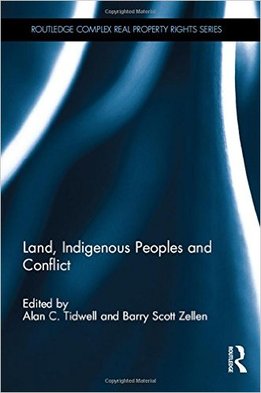
Zellen's 13th published book and third edited (and second to be co-edited) volume, a collaboration with professor Alan Tidwell, director of Georgetown University's Center for Australia, New Zealand and Pacific Studies (CANZPS) where Zellen was a senior fellow from 2012-18, was accepted for publication in Routledge's Complex Real Property Rights Series in August 2014, and came to press on October 12, 2015 -- 523 years to the day that Columbus famously (and for America's first peoples, tragically) made landfall in the Americas.
The work is called Land, Indigenous Peoples and Conflict, a comparative look at the relationship between indigenous peoples and the state around the world, from the Arctic to the tropics -- and the diverse solutions to the many land conflicts between the first peoples for whom these lands are traditional homeland, and the modern states that assert sovereignty over those lands.
It presents chapters from experts on the Americas, the Asia-Pacific region, Africa and Europe, as well as reflections and observations by the editors on both the striking similarities that bind far-flung regions together through a unified colonial experience and parallel history of reconciliation between settler states and indigenous peoples, and the many fascinating, subtle differences that distinguish each region for its cultural, geographical, and economic distinctiveness.
The work is called Land, Indigenous Peoples and Conflict, a comparative look at the relationship between indigenous peoples and the state around the world, from the Arctic to the tropics -- and the diverse solutions to the many land conflicts between the first peoples for whom these lands are traditional homeland, and the modern states that assert sovereignty over those lands.
It presents chapters from experts on the Americas, the Asia-Pacific region, Africa and Europe, as well as reflections and observations by the editors on both the striking similarities that bind far-flung regions together through a unified colonial experience and parallel history of reconciliation between settler states and indigenous peoples, and the many fascinating, subtle differences that distinguish each region for its cultural, geographical, and economic distinctiveness.
Arctic Exceptionalism: Cooperation in a Contested World (2024)

Currently in production, my 14th book, Arctic Exceptionalism: Cooperation in a Contested World, a structural realist analysis of the enduring geopolitical roots of Arctic exceptionalism and the stabilizing impact of the fourth image on Arctic international relations, is scheduled for publication in the summer of 2024 (current ETA: July 2024) For more than three centuries, the Arctic region has been a zone of increasingly collaborative, multilevel and multilateral governance and diplomacy (albeit with occasional setbacks, particularly during times of intensifying strategic competition, including war time).
The interests of diverse sovereign states, indigenous peoples, NGOs, and other stakeholders have largely aligned across this impressive duration—even during periods of global conflict such as World War II and the Cold War. Now, however, its consensus-based foundations are being tested once again, straining the collaborative dynamic known as Arctic exceptionalism.
While many scholars suggest Arctic exceptionalism is either now dead, or on life support and fading fast, I argue that it is alive and well, albeit undergoing a regional realignment under the pressures of Russia’s military resurgence.
Dr. Christopher Kirkey, Director of the Center for the Study of Canada and Institute on Québec Studies at the State University of New York College at Plattsburgh, describes this book as a “timely, compelling account of the international forces that influence and constrain the foundations and functions of Arctic collaboration.”
Dr. Alan Tidwell, Director, Center for Australian, New Zealand and Pacific Studies, Walsh School of Foreign Service, Georgetown University observes: "Barry Zellen delivers a thoughtful and inspired analysis of the Arctic world. His insights weave between the world of great power competition to the intricacies of indigenous identity. No scholar or policymaker interested in the Arctic can miss Zellen's views. Arctic Exceptionalism: Cooperation in a Contested World will long be a standard against which Arctic scholarship will be measured."
Dr. Julian Reid, philosopher, political theorist and Professor of International Relations at University of Lapland observes, "Zellen offers a thoroughly unique perspective on Arctic exceptionalism. Readers of this book will be led to think differently about the Arctic and its geopolitical futures, and the underlying theories of peace and war which have shaped knowledge of the Arctic in International Relations. Zellen does not sit on the fence. He intervenes in several debates concerning both the history and future of the Arctic and pinpoints the weak spots of dominant approaches to its geopolitics. I urge every scholar of Arctic International Relations to read this book."
Ed Struzik, a fellow at Queen’s Institute for Energy and Environmental Policy at Queen’s University in Canada and author of Future Arctic, Field Notes from a World on the Edge, points out: "The Arctic was long a model for international cooperation until Russia invaded Ukraine in the winter of 2022, upending decades-long governance through the Arctic Council, international conventions and multilateral research on climate change, fisheries, and wildlife conservation. Many experts assert that there will be no going back to this pre-war exceptionalism. In this well-researched and provocative book, Barry Zellen offers ways to move forward as well as a cautionary tale that sees the circumpolar world divided between East and West and a long delay in what is needed to deal with rising sea levels, sea ice loss, permafrost thaw and wildfires that are burning bigger, hotter and more often in a world where indigenous concerns are paramount."
As Dr. Alun Mark Anderson, author of After the Ice: Life, Death and Geopolitics in the New Arctic (2009) and past editor-in-chief and publishing director of New Scientist (1992-2005) describes: "Great book ... The Arctic’s exceptional history of peace and cooperation is under threat from new tensions and hasty decisions. Zellen provides a unique analysis, tempering realism with optimism, of the deep roots of Arctic exceptionalism. This is not simply a book about Arctic exceptionalism, and the long history of peace and cooperation that sets this region apart, but also a call for action. Zellen's unique analysis of Arctic exceptionalism’s roots and the forces that created it, tempering realism with optimism, tell us that the region can weather current tensions and keep cooperation growing. No previous author has provided such an insightful analysis of Arctic exceptionalism, its deep roots, resilience and the forces that could end or save it. With the unique period of pan-Arctic peace and collaboration now under threat as never before, it is urgent reading for every stakeholder who wants to see the region’s cooperative spirit continue into the future. Every Arctic stakeholder should read this book and feel empowered to push the Arctic to a better future."
Dr. Pan Min, Deputy Director of the Center for Polar and Oceanic Studies and Associate Professor, School of Political Science and International Relations, Tong Ji University, observes: "It is an interesting and great book. On the basis of developing Waltz's Three images into Four images, the author presents to readers the roots of Arctic exceptionalism through rich materials and rigorous arguments -- challenges of the northern landscape and demographic structure of the Arctic region have led to the existence of strong subnational communities (such as colonial-era chartered companies and the indigenous organization and their local governments) as well as a balance of power and interests between local and outsiders, and long-term collaboration between them. And this cooperation model extends from the domestic level to the whole Arctic region. It makes me wonder if this collaborative model can be extended to world politics. However, the Arctic has not deviated from the power and interest struggles described by the modern international relations theories. We could feel the author's strong humanistic care between the lines of the text. The highlights of the book are the intellectual battles and successful co-management between the Inuit and the sovereign states of Arctic North America, as well as the author's brilliant analysis of them. Everyone who studies the Arctic and international relations should read this book."
As Dr. Heather N. Nicol, Director of the School for the Study of Canada and Professor of Geography in the School of the Environment at Trent University, describes: "This book takes a fresh look at some of the ways in which the Arctic has been positioned on the global stage. Zellen reworks notions of exceptionalism and sovereignty in support of a new range of possibilities for the future of the Arctic region. The broad ranging discussion in this book pulls together the various threads of analysis that have informed geopolitical assessments of the Arctic region, shedding light on the long-standing and mutually constitutive relationships between the region's Indigenous Peoples and Arctic states. Exceptionalism and self-determination are positioned as the result of the long-standing and pragmatic colonial and globalized architecture of Arctic international relations. Well worth the read."
As Dr. Timothy R. Tangherlini, Professor of Scandinavian at the University of California, Berkeley, observes: "An important and timely reminder of the vital role of the Arctic in a period of increasing global volatility. In this new volume, Zellen adds to his already formidable scholarship on the Arctic, weaving together the critically important considerations of the indigenous and clear avenues for productive engagement with the Arctic predicated on notions of cooperation and consensus. A welcome departure from the super-power-centric views of much Arctic scholarship, Zellen highlights the importance of the indigenous and the Nordic for a holistic understanding of the political, cultural, economic and geographical exceptionalism that marks the Arctic, charting a way forward for the ongoing negotiations that may lead to a sustainable Arctic."
As Dr. Giorgio Baruchello, Professor, Faculty of Humanities and Social Sciences, University of Akureyri, and editor-in-chief of Nordicum-Mediterraneum: Icelandic e-Journal of Nordic and Mediterranean Studies, describes: "The Arctic Council has long represented an inspiring, concrete and rare, if not unique, paradigm of peaceful, multilateral cooperation across both the old and new Cold War fault-lines, as well as the State-vs-Indigenous-actors one—that is to say, until Russia's invasion of Ukraine in 2022. Nobody knows nor can credibly envision what the world’s future is exactly going to be like. Nonetheless, Dr. Barry Zellen offers an informed and informative survey of the Council's history, work and example, as well as of the Arctic region's collaborative and constructive combination of competing interests and vital needs over the past few decades. By so doing, Zellen sheds much valuable and much-needed light on current, unfolding, only seemingly-marginal Arctic geopolitical scenarios, and strikes a balanced, well-argued, insightful, and subtly optimistic note on the region's forthcoming trends in international relations and responsible governance."
Dr. Chuanxing Wang, Professor of International Relations at the Center for Polar and Maritime Studies, School of Political Science and International Relations, Tong Ji University, holds “this is a timely book because at this time when Arctic exceptionalism ‘has been under new pressures’ recently , Zellen defends this exceptionalism by dating it back to the Arctic tradition of tribe-state co-management in history, and by emphasizing its significance to the reality of cooperation in the Arctic today.”
Dr. Joji Morishita, Advisor, Ministry of Agriculture, Forestry, and Fisheries, Government of Japan and formerly Japan’s Commissioner to the International Whaling Commission (2013-18; IWC Chair 2016-18); Director-General, National Research Institute of Far Seas Fisheries (2013-16); Counsellor (2008-13) and Senior Negotiator (2005-08), Japan Fisheries Agency; and First Secretary, Embassy of Japan to the USA (1993-96) observes: "This book by Barry Scott Zellen is an excellent reference that systematically covers the history and current state of the legal framework in the Arctic, but it would be an underestimation and even an insult to position it as merely an Arctic legal compendium, and not much more. If the building blocks of this book are an extensive description of policy developments in the relevant countries and international frameworks related to the Arctic region and the legal instruments that implement and manage them, this book provides and discusses several elements, perspectives, and points of view that penetrate these building blocks and further influence the way they are built up.
For example, the perspective of indigenous peoples is indispensable when discussing the Arctic region. The issues and situations surrounding indigenous peoples and the resulting policies of Arctic nations, both domestic and international, have undergone many changes, and this book translates legal commentary into a lively narrative that reflects the author's extensive knowledge and in-depth consideration of this issue.
The author also discusses in detail one of the biggest challenges facing the modern world today, climate change, and its impact on the Arctic region and the Arctic legal system. Furthermore, the main target of this book is the question of how to view the present and future of the Arctic region and how to rebuild international cooperation in the context of a divided and destabilized world, including Russia's invasion of Ukraine. It is obvious that this is not an easy challenge, but this book offers us valuable insights and suggestions."
And, as Dr. Nadine C. Fabbi, Director, Canadian Studies Center and Chair, Arctic Studies Minor, Henry M. Jackson School of International Studies, University of Washington, Seattle, has informed is: "I have made this our required course text for Inuit studies!"
Contents
The interests of diverse sovereign states, indigenous peoples, NGOs, and other stakeholders have largely aligned across this impressive duration—even during periods of global conflict such as World War II and the Cold War. Now, however, its consensus-based foundations are being tested once again, straining the collaborative dynamic known as Arctic exceptionalism.
While many scholars suggest Arctic exceptionalism is either now dead, or on life support and fading fast, I argue that it is alive and well, albeit undergoing a regional realignment under the pressures of Russia’s military resurgence.
Dr. Christopher Kirkey, Director of the Center for the Study of Canada and Institute on Québec Studies at the State University of New York College at Plattsburgh, describes this book as a “timely, compelling account of the international forces that influence and constrain the foundations and functions of Arctic collaboration.”
Dr. Alan Tidwell, Director, Center for Australian, New Zealand and Pacific Studies, Walsh School of Foreign Service, Georgetown University observes: "Barry Zellen delivers a thoughtful and inspired analysis of the Arctic world. His insights weave between the world of great power competition to the intricacies of indigenous identity. No scholar or policymaker interested in the Arctic can miss Zellen's views. Arctic Exceptionalism: Cooperation in a Contested World will long be a standard against which Arctic scholarship will be measured."
Dr. Julian Reid, philosopher, political theorist and Professor of International Relations at University of Lapland observes, "Zellen offers a thoroughly unique perspective on Arctic exceptionalism. Readers of this book will be led to think differently about the Arctic and its geopolitical futures, and the underlying theories of peace and war which have shaped knowledge of the Arctic in International Relations. Zellen does not sit on the fence. He intervenes in several debates concerning both the history and future of the Arctic and pinpoints the weak spots of dominant approaches to its geopolitics. I urge every scholar of Arctic International Relations to read this book."
Ed Struzik, a fellow at Queen’s Institute for Energy and Environmental Policy at Queen’s University in Canada and author of Future Arctic, Field Notes from a World on the Edge, points out: "The Arctic was long a model for international cooperation until Russia invaded Ukraine in the winter of 2022, upending decades-long governance through the Arctic Council, international conventions and multilateral research on climate change, fisheries, and wildlife conservation. Many experts assert that there will be no going back to this pre-war exceptionalism. In this well-researched and provocative book, Barry Zellen offers ways to move forward as well as a cautionary tale that sees the circumpolar world divided between East and West and a long delay in what is needed to deal with rising sea levels, sea ice loss, permafrost thaw and wildfires that are burning bigger, hotter and more often in a world where indigenous concerns are paramount."
As Dr. Alun Mark Anderson, author of After the Ice: Life, Death and Geopolitics in the New Arctic (2009) and past editor-in-chief and publishing director of New Scientist (1992-2005) describes: "Great book ... The Arctic’s exceptional history of peace and cooperation is under threat from new tensions and hasty decisions. Zellen provides a unique analysis, tempering realism with optimism, of the deep roots of Arctic exceptionalism. This is not simply a book about Arctic exceptionalism, and the long history of peace and cooperation that sets this region apart, but also a call for action. Zellen's unique analysis of Arctic exceptionalism’s roots and the forces that created it, tempering realism with optimism, tell us that the region can weather current tensions and keep cooperation growing. No previous author has provided such an insightful analysis of Arctic exceptionalism, its deep roots, resilience and the forces that could end or save it. With the unique period of pan-Arctic peace and collaboration now under threat as never before, it is urgent reading for every stakeholder who wants to see the region’s cooperative spirit continue into the future. Every Arctic stakeholder should read this book and feel empowered to push the Arctic to a better future."
Dr. Pan Min, Deputy Director of the Center for Polar and Oceanic Studies and Associate Professor, School of Political Science and International Relations, Tong Ji University, observes: "It is an interesting and great book. On the basis of developing Waltz's Three images into Four images, the author presents to readers the roots of Arctic exceptionalism through rich materials and rigorous arguments -- challenges of the northern landscape and demographic structure of the Arctic region have led to the existence of strong subnational communities (such as colonial-era chartered companies and the indigenous organization and their local governments) as well as a balance of power and interests between local and outsiders, and long-term collaboration between them. And this cooperation model extends from the domestic level to the whole Arctic region. It makes me wonder if this collaborative model can be extended to world politics. However, the Arctic has not deviated from the power and interest struggles described by the modern international relations theories. We could feel the author's strong humanistic care between the lines of the text. The highlights of the book are the intellectual battles and successful co-management between the Inuit and the sovereign states of Arctic North America, as well as the author's brilliant analysis of them. Everyone who studies the Arctic and international relations should read this book."
As Dr. Heather N. Nicol, Director of the School for the Study of Canada and Professor of Geography in the School of the Environment at Trent University, describes: "This book takes a fresh look at some of the ways in which the Arctic has been positioned on the global stage. Zellen reworks notions of exceptionalism and sovereignty in support of a new range of possibilities for the future of the Arctic region. The broad ranging discussion in this book pulls together the various threads of analysis that have informed geopolitical assessments of the Arctic region, shedding light on the long-standing and mutually constitutive relationships between the region's Indigenous Peoples and Arctic states. Exceptionalism and self-determination are positioned as the result of the long-standing and pragmatic colonial and globalized architecture of Arctic international relations. Well worth the read."
As Dr. Timothy R. Tangherlini, Professor of Scandinavian at the University of California, Berkeley, observes: "An important and timely reminder of the vital role of the Arctic in a period of increasing global volatility. In this new volume, Zellen adds to his already formidable scholarship on the Arctic, weaving together the critically important considerations of the indigenous and clear avenues for productive engagement with the Arctic predicated on notions of cooperation and consensus. A welcome departure from the super-power-centric views of much Arctic scholarship, Zellen highlights the importance of the indigenous and the Nordic for a holistic understanding of the political, cultural, economic and geographical exceptionalism that marks the Arctic, charting a way forward for the ongoing negotiations that may lead to a sustainable Arctic."
As Dr. Giorgio Baruchello, Professor, Faculty of Humanities and Social Sciences, University of Akureyri, and editor-in-chief of Nordicum-Mediterraneum: Icelandic e-Journal of Nordic and Mediterranean Studies, describes: "The Arctic Council has long represented an inspiring, concrete and rare, if not unique, paradigm of peaceful, multilateral cooperation across both the old and new Cold War fault-lines, as well as the State-vs-Indigenous-actors one—that is to say, until Russia's invasion of Ukraine in 2022. Nobody knows nor can credibly envision what the world’s future is exactly going to be like. Nonetheless, Dr. Barry Zellen offers an informed and informative survey of the Council's history, work and example, as well as of the Arctic region's collaborative and constructive combination of competing interests and vital needs over the past few decades. By so doing, Zellen sheds much valuable and much-needed light on current, unfolding, only seemingly-marginal Arctic geopolitical scenarios, and strikes a balanced, well-argued, insightful, and subtly optimistic note on the region's forthcoming trends in international relations and responsible governance."
Dr. Chuanxing Wang, Professor of International Relations at the Center for Polar and Maritime Studies, School of Political Science and International Relations, Tong Ji University, holds “this is a timely book because at this time when Arctic exceptionalism ‘has been under new pressures’ recently , Zellen defends this exceptionalism by dating it back to the Arctic tradition of tribe-state co-management in history, and by emphasizing its significance to the reality of cooperation in the Arctic today.”
Dr. Joji Morishita, Advisor, Ministry of Agriculture, Forestry, and Fisheries, Government of Japan and formerly Japan’s Commissioner to the International Whaling Commission (2013-18; IWC Chair 2016-18); Director-General, National Research Institute of Far Seas Fisheries (2013-16); Counsellor (2008-13) and Senior Negotiator (2005-08), Japan Fisheries Agency; and First Secretary, Embassy of Japan to the USA (1993-96) observes: "This book by Barry Scott Zellen is an excellent reference that systematically covers the history and current state of the legal framework in the Arctic, but it would be an underestimation and even an insult to position it as merely an Arctic legal compendium, and not much more. If the building blocks of this book are an extensive description of policy developments in the relevant countries and international frameworks related to the Arctic region and the legal instruments that implement and manage them, this book provides and discusses several elements, perspectives, and points of view that penetrate these building blocks and further influence the way they are built up.
For example, the perspective of indigenous peoples is indispensable when discussing the Arctic region. The issues and situations surrounding indigenous peoples and the resulting policies of Arctic nations, both domestic and international, have undergone many changes, and this book translates legal commentary into a lively narrative that reflects the author's extensive knowledge and in-depth consideration of this issue.
The author also discusses in detail one of the biggest challenges facing the modern world today, climate change, and its impact on the Arctic region and the Arctic legal system. Furthermore, the main target of this book is the question of how to view the present and future of the Arctic region and how to rebuild international cooperation in the context of a divided and destabilized world, including Russia's invasion of Ukraine. It is obvious that this is not an easy challenge, but this book offers us valuable insights and suggestions."
And, as Dr. Nadine C. Fabbi, Director, Canadian Studies Center and Chair, Arctic Studies Minor, Henry M. Jackson School of International Studies, University of Washington, Seattle, has informed is: "I have made this our required course text for Inuit studies!"
Contents
- Arctic Exceptionalism.
- Strategic Expansion to the Arctic Region.
- The Age of Arctic Land Claims.
- Inuit Sovereignty in a Westphalian World.
- The Rise and Collapse of Consensus.
- The Realist Foundations of a Collaborative Arctic Order.
- A Cooperative Arctic in a Contested World?
Prior Affiliations
Zellen has held numerous research and editorial affiliations over the years.
- Researcher, Cryo-Geopolitics in the Arctic Region Project with responsibility for authoring a 30,000 word report on the new Arctic policies in Canada and the USA (2023);
- Arctic International Correspondent, Intersec: The Journal of International Security (2022-present); I previously served as Intersec's Homeland Security and Counterterrorism Correspondent (2001-2010) and as contributing columnist (2011-2021).
- Fulbright Scholar at the University of Akureyri (UNAK)'s Polar Law Centre, where he designed and taught a graduate course on Arctic security through the lens of IR theory (Spring 2020).
- In July 2021, Zellen served as guest editor of a special edition of the Nordicum Mediterraneum (NoMe) Journal, published at UNAK, featuring selected student papers and two of his writings on Arctic geopolitics with a guest foreword from H.E. Fridrik Jonsson, Senior Arctic Official at Iceland's Ministry of Foreign Affairs.
- Class of 1965 Arctic Scholar, U.S. Coast Guard Academy (2019-22);
- Kone Foundation (Koneen Säätiö) Postdoctoral Researcher (2016-18);
- Co-Chair of the Arctic and Northern Section, Association for Canadian Studies in the United States (ACSUS) (2016-21);
- Senior Fellow/Research Affiliate, Georgetown University's Edmund A. Walsh School of Foreign Service, Center for Australia, New Zealand and Pacific Studies (CANZPS) (2012-18);
- Board Member, Arctic Research Consortium of the United States (ARCUS) (2012-14);
- Research Affiliate and Editor at the U.S. Naval Postgraduate School (2004-12), in roles that included serving as Managing/Web/Production Editor of the Strategic Insights journal at the Center for Contemporary Conflict (2004-10); Managing/Web/Production Editor of The Culture and Conflict Review at the Program for Culture and Conflict Studies (2008-12); and Webmaster and Editor for the Department of National Security Affairs (2004-2010). I also directed the Arctic Security Project during this time period.
